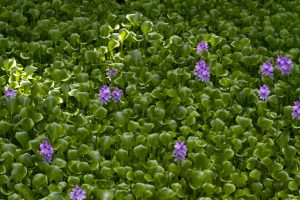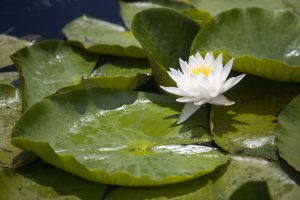Hello Avid Readers and welcome back! July is “Lakes Appreciation Month”. I know I love to paddle and fish on the lakes near me, and I’m sure many of you do as well. Have you ever been on a lake and wondered how it was created or how it’s maintained? Have you considered, what role pesticides play in our Florida lake systems? If you are curious or concerned read on as I wade into these topics and more.
Florida’s Lakes
Where did all of Florida’s lakes come from? Well, long ago this whole state was underwater! This is one reason why our state has so many fossils and why the base of our state is made mostly of limestone. Limestone is very soluble in rainwater, it dissolves, which makes it more likely to form sinkholes. Therefore, most of our lakes were formed from sinkholes and are relatively shallow. Florida’s lakes are unique in comparison to others across the country because they were formed this way.

Our lakes are vital to the ecosystem and provide a habitat for many different animals. Most people think of gators but we also have many different fish, frogs, aquatic plants, and insects. Lakes also provide water and homes for our mammal species, like beavers and otters. Overall Florida’s lakes provide huge areas for biodiversity, while also supporting human activities. I love to paddle and fish, but the lakes also provide irrigation water, help with flood control, and serve as recreational areas for swimming and bird watching. The UF/IFAS Center for Aquatic and Invasive Plants has a podcast “Working in the Weeds” which has an episode just on Florida’s Lakes and Landscapes. It’s a great way to pass the time during a car ride and learn more about our Florida lakes!

Invasive species Management
Florida is very prone to collecting invasive species. We have a great climate for a wide array of organisms, lots of tourism, and many points of access, or ways for things to get into the state. These invasive species can wreak havoc on our natural systems. They reduce biodiversity by out-competing our native species. They can also reduce the utility of the lakes for our recreation or irrigation needs. To better understand and learn about invasive plants in our lakes check out the UF Center for Aquatic and Invasive Plants.
Lakes are managed for invasive species and other pests based on how they are used, fishing versus irrigation for example. Each lake also has a different size, depth, and community it supports. This may be referred to as a part of the lake’s personality. The lake’s personality has a lot to do with how we manage the pests in that system. The podcast “Working in the Weeds” also has an episode about the personality of Lake Tohopekaliga. Check it out for a better understanding of how our lakes can differ, and how that affects management.

Pesticide Safety
No matter what purpose a lake is being managed for there is the possibility pesticides may be used in that management process. It is vital to these natural resources that pesticides be used safely. This includes reading the label, selecting the most targeted products to avoid non-target effects, and applying pesticides as part of an integrated pest management program.
Most pesticides used in lakes in Florida have low overall toxicity and are not Restricted Use Pesticides or RUPs. So, pesticide applicators using these products are not required by law to be a “certified” applicator. However, many of the applicators go through training and certification anyway, both to protect themselves and to protect the environment. After all the pest management specialists are there to increase the utility of the water and want the resource to remain healthy. Many of them are fishermen themselves! For more information about pesticide safety and how applicators become certified, check our website at the Pesticide Information Office.
Summary
Our lakes are valuable resources that deserve our respect and protection. They support a huge amount of life and provide humans with a lot of resources and fun! Florida’s lakes have many different “personalities” and are managed and maintained accordingly. Additionally, our geographic location and climate make our lakes susceptible to invasive species which have negative effects on biodiversity, recreation, and many other uses. These invasive are sometimes managed through the use of pesticides and this pesticide use must be performed safely as part of an integrated pest management program. Many pesticide applicators go through training to ensure they are protecting themselves and our valuable natural resources.

Additional Resources
Some of Florida’s residents have gotten involved in protecting our lakes through LAKEWATCH and their citizen science opportunities. Learn more from “Working in the Weeds” Florida LAKEWATCH.
Florida Fish and Wildlife Conservation Commission
Efficacy of Herbicide Active Ingredients against Aquatic Weeds
Water Quality and the Effectiveness of Pesticides
Plant Management in Florida Waters
Source: UF/IFAS Pest Alert
Note: All images and contents are the property of UF/IFAS.



